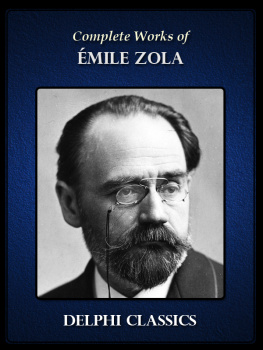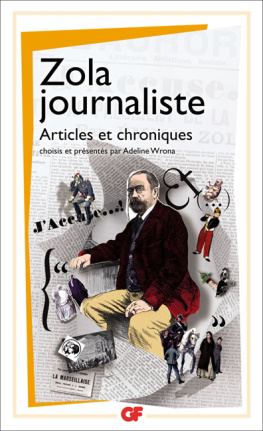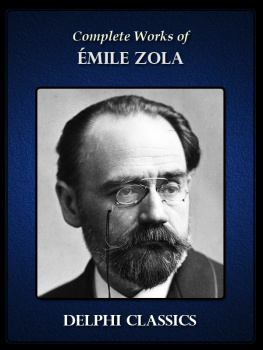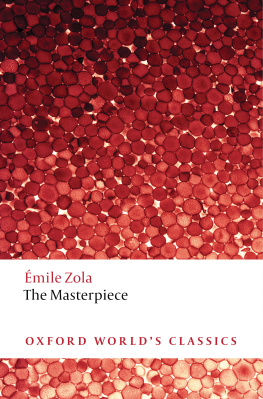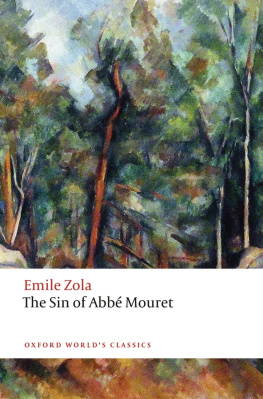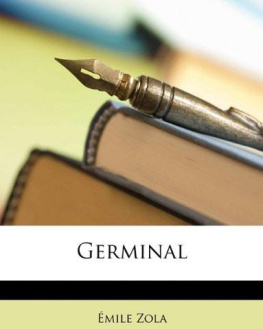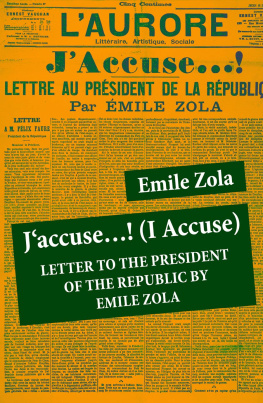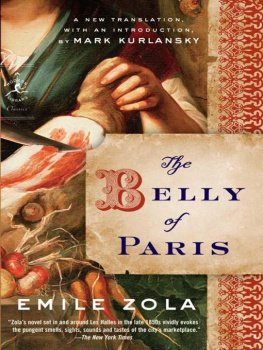Émile Zola - The Earth: La Terre (Penguin Classics)
Here you can read online Émile Zola - The Earth: La Terre (Penguin Classics) full text of the book (entire story) in english for free. Download pdf and epub, get meaning, cover and reviews about this ebook. year: 1980, publisher: Penguin Classics, genre: Detective and thriller. Description of the work, (preface) as well as reviews are available. Best literature library LitArk.com created for fans of good reading and offers a wide selection of genres:
Romance novel
Science fiction
Adventure
Detective
Science
History
Home and family
Prose
Art
Politics
Computer
Non-fiction
Religion
Business
Children
Humor
Choose a favorite category and find really read worthwhile books. Enjoy immersion in the world of imagination, feel the emotions of the characters or learn something new for yourself, make an fascinating discovery.

- Book:The Earth: La Terre (Penguin Classics)
- Author:
- Publisher:Penguin Classics
- Genre:
- Year:1980
- Rating:5 / 5
- Favourites:Add to favourites
- Your mark:
- 100
- 1
- 2
- 3
- 4
- 5
The Earth: La Terre (Penguin Classics): summary, description and annotation
We offer to read an annotation, description, summary or preface (depends on what the author of the book "The Earth: La Terre (Penguin Classics)" wrote himself). If you haven't found the necessary information about the book — write in the comments, we will try to find it.
The Earth: La Terre (Penguin Classics) — read online for free the complete book (whole text) full work
Below is the text of the book, divided by pages. System saving the place of the last page read, allows you to conveniently read the book "The Earth: La Terre (Penguin Classics)" online for free, without having to search again every time where you left off. Put a bookmark, and you can go to the page where you finished reading at any time.
Font size:
Interval:
Bookmark:
PENGUIN  CLASSICS
CLASSICS
THE EARTH
E MILE Z OLA , born in Paris in 1840, was brought up at Aix-en-Provence in an atmosphere of struggling poverty after the death of his father in 1847. He was educated at the Collge Bourbon at Aix and then at the Lyce Saint-Louis in Paris. He was obliged to exist by poorly paid clerical jobs after failing his baccalaurat in 1859, but early in 1865 he decided to support himself by literature alone. Despite his scientific pretensions Zola was really an emotional writer with rare gifts for evoking vast crowd scenes and for giving life to such great symbols of modern civilization as factories and mines. When not overloaded with detail, his work has tragic grandeur, but he is also capable of a coarse, Cockney type of humour. From his earliest days Zola had contributed critical articles to various newspapers, but his first important novel, Thrse Raquin, was published in 1867, and Madeleine Frat in the following year. That same year he began work on a series of novels intended to follow out scientifically the effects of heredity and environment on one family: Les Rougon-Macquart. The work contains twenty novels, which appeared between 1871 and 1893, and is the chief monument of the French Naturalist movement. On completion of this series he began a new cycle of novels, Les Trois Villes: Lourdes, Rome, Paris (189468), a violent attack on the Church of Rome; this led to yet another cycle, Les Quatre vangiles. He died in 1902 while working on the fourth of these.
D OUGLAS P ARME studied at Trinity College, Cambridge, the University of Bonn, and the Sorbonne. After serving in RAF Intelligence, he returned to teach at Cambridge, where he was Fellow and Director of Studies at Queens' College. He now lives in Adelaide, South Australia. He has written widely on French studies, notably on 19th and 20th century French poetry; he is also a prize-winning translator, mainly from French and German. His other translations in the Penguin Classics are Maupassant's Bel-Ami and Fontane's Effi Briest.
MILE ZOLA
[La Terre]
TRANSLATED WITH AN INTRODUCTION BY
DOUGLAS PARME
PENGUIN BOOKS
PENGUIN BOOKS
Published by the Penguin Group
Penguin Books Ltd, 80 Strand, London WC2R 0RL, England
Penguin Putnam Inc., 375 Hudson Street, New York, New York 10014, USA
Penguin Books Australia Ltd, Ringwood, Victoria, Australia
Penguin Books Canada Ltd, 10 Alcorn Avenue, Toronto, Ontario, Canada M4V 3B2
Penguin Books India (P) Ltd, 11 Community Centre, Panchsheel Park, New Delhi 110 017, India
Penguin Books (NZ) Ltd, Cnr Rosedale and Airborne Roads, Albany, Auckland, New Zealand
Penguin Books (South Africa) (Pty) Ltd, 24 Sturdee Avenue, Rosebank 2196 South Africa
Penguin Books Ltd, Registered Offices: 80 Strand, London WC2R 0RL, England
www.penguin.com
This translation first published 1980
Copyright Douglas Parme, 1980
All rights reserved
Except in the United States of America, this book is sold subject to the condition that it shall not, by way of trade or otherwise, be lent, re-sold, hired out, or otherwise circulated without the publisher's prior consent in any form of binding or cover other than that in which it is published and without a similar condition including this condition being imposed on the subsequent purchaser
ISBN: 978-0-14-193320-7
MILE Z OLA (18401902) first planned his vast cyclical series of novels, under the title histoire naturelle et sociale d'une famille sous le Second Empire, in the late sixties of the last century. While Balzac's Comdie humaine cast its vast shadow over the project, Zola's cycle, concerning five generations of the Rougon-Macquart family, was intended to be much more overtly and consciously scientific. He had been greatly attracted to the ideas of the positivist philosopher Hippolyte Taine, who particularly stressed the influence of the physical over the psychological. Taine's conclusion that there are three main determinants of personality la race (heredity), le milieu (environment) and le moment (not only the moment of time but the dynamic momentum of an age) was eagerly accepted by Zola; and later on, under the influence of the great French physiologist Claude Bernard, he entertained far more nonsensical ideas, for example using the novel as a sort of laboratory to prove certain hypotheses. Fortunately, by the time he came to write La Terre, these scientific enthusiasms had considerably waned and despite the fact that a closed, materialistic agricultural community offered great scope for the observation of heredity and environment, Zola managed to resist this obvious temptation. The most superficial reading of his novel makes it plain that psychology is not ruthlessly sacrificed to physiology and that many, indeed most of his characters, despite the material pressures, lead vigorously independent mental and moral lives, often of considerable subtlety. The image of Zola as a depicter of mindless automata is sheer myth.
The idea of a peasant novel seems to have come late to Zola. His preliminary project on the cycle makes no mention of such a work nor is there any trace of it in the first genealogical tree in 1878. The family's representative in La Terre, Jean Macquart, was originally intended to figure only in La Dbcle, a later novel dealing with the Franco-Prussian war of 187071; indeed, in the last chapter of La Terre he is seen deciding to join up and bash a few Prussians, though in the event he is the one who is bashed. Readers of La Terre who find him interesting and Zola did his best not to make him too much of a pure accessory, even though he still seems rather unresolved may like to know that he recovers from his wounds and in Le Docteur Pascal, the last novel of the series, he goes back to the land in the less bleak region of Provence remarries and rears a family. In La Terre, he has one distinguishing moral quality: unlike almost all the others, he is shown as capable of tenderness, in his relation with his future wife Franoise; as Jean is very much the outsider in this village community, is there not a suggestion here that tenderness is a luxury that peasants cannot afford? Be that as it may, the link between La Terre and the rest of the series is a tenuous one and the novel seems all the better for the fact that Zola steers clear of too much science and gives freer rein to his imagination.
Not until 1880, then, do we first find mention of La Terre, when at its very conception he announces that it is going to be his favourite work. His confidence was well-founded. By 1880 he had already written nearly half of his cycle, covering such fields as provincial life (Plassans, alias Aix-en-Provence); political intrigue in Paris; les Halles, the Parisian central food market (in his younger years Zola was something of a gourmand and his description of piles of French cheese is mouth-watering); the Parisian slums (L'Assommoir) and the life of high-class prostitution (Nana). Both of these last novels obtained such a succs de scandale that he would have been silly not to realize the market value of squalor and eroticism, and such considerations cannot have been completely absent from his mind in writing La Terre. However, before La Terre was published, he was to write five more novels, including studies of the urban middle classes, of artistic circles (which cost him the friendship of his old friend from Aix, Paul Czanne) and also perhaps his best known work,
Next pageFont size:
Interval:
Bookmark:
Similar books «The Earth: La Terre (Penguin Classics)»
Look at similar books to The Earth: La Terre (Penguin Classics). We have selected literature similar in name and meaning in the hope of providing readers with more options to find new, interesting, not yet read works.
Discussion, reviews of the book The Earth: La Terre (Penguin Classics) and just readers' own opinions. Leave your comments, write what you think about the work, its meaning or the main characters. Specify what exactly you liked and what you didn't like, and why you think so.

